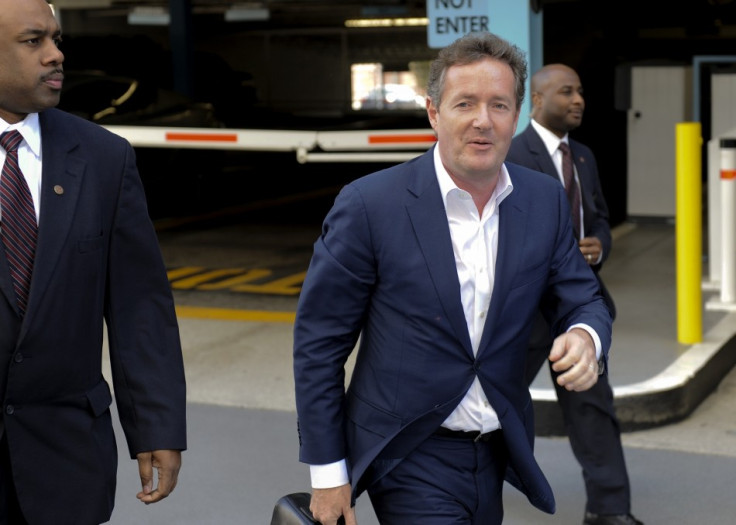Leveson Inquiry: James Hipwell v Piers Morgan

A day after ex-Daily Mirror editor Piers Morgan gave evidence to the Leveson Inquiry into press standards, one of his former journalists contradicted some of what he said.
James Hipwell, who wrote for the Daily Mirror's City Slickers column when the paper was edited by Morgan, gave his account of life as a journalist under Morgan to Leveson.
Hipwell was jailed in 2005 for market manipulation, after the City Slickers column gave a share tip to a company called Viglen in 2000, in which they both held stocks.
The day before Viglen was tipped by his newspaper, Morgan bought £67,000 of shares in the company.
A Press Complaints Commission (PCC) adjudication upheld a complaint against Morgan for the incident, but a four-year investigation by the Department for Trade and Industry resulted in no action being taken against him.
Hipwell said he thinks Morgan got away with his part in the scandal and that "neither Trinity Mirror or Mr Morgan took responsibility for what happened".
International Business Times UK looks at where the two sets of evidence contradict each other.
Morgan
"I reckon the average editor is aware of about five per cent of what his journalists are up to at any particular time."
Hipwell
"The thing about Piers is that he was a very hands-on editor ... He was the beating heart of the newspaper."
"[Morgan] would go up behind journalists and look at what they were writing on screen."
Morgan
On if phone hacking took place at the Daily Mirror while he was editor: "I don't believe so. To the best of my recollection, I do not believe so."
"My evidence is that I have no knowledge or reason to believe [phone hacking] was going on."
Hipwell
"I would go as far as to say [phone hacking] happened every day."
"[Morgan] would spend half an hour a day sitting with the showbiz team talking about their stories."
"I can remember the practice, I can remember this was a very common thing for a showbusiness desk to do."
"Nothing really happened on [the showbiz] desk without Piers knowing about it."
"Occasionally, when big stories emerged, he would ask us ... about the source of our information."
Morgan
"[The PCC Code of Practice] was displayed prominently in the newsroom of the Daily Mirror throughout [my] tenure as editor and informed every editorial decision I made during my tenure as editor of the News of the World and the Daily Mirror."
At the Daily Mirror, my understanding is that the ethical standards expected of journalists were spelled out in their employment contracts, which stipulated that a journalist must operate within the law, and the [PCC] Code of Practice."
Hipwell
"I'd never ever seen a copy of the PCC code while I was working at Trinity Mirror."
Morgan
On why the PCC wasn't given certain, important information relating to the Viglen share-tipping scandal involving the Daily Mirror:
"You'd have to ask Trinity Mirror. They were the ones who did that. I've read the adjudication here to remind myself and I've read why Trinity Mirror did that. I've tried to outline their reasoning but I think for further details on this, you'd have to ask them."
Hipwell
On if he thought Morgan got away with his part in the Viglen scandal:
"I always thought so, I can understand why people think I have an axe to grind.
"It has always been my contention that neither Trinity Mirror or Mr Morgan took responsibility for what happened.
"I think I did trade on the same information as he did. As far as the companies went, his investments were very much larger than anyone else on the newspaper with one company called Viglen, chaired by Alan Sugar who was a columnist on the Mirror, [Morgan's] investment was £67,000."
Morgan
"I note that Mr Hipwell is a convicted criminal who changed his story on a number of occasions during the City Slickers investigation, in part to wrongfully implicate me.
"I believe any testimony he gives to be inherently unreliable. While it is for the Inquiry to consider the credibility of his testimony, I have real concerns that that testimony is motivated primarily by the prospect of exacting revenge on former colleagues, employers and superiors.
"Certainly, a criminal court has made clear its views as to his credibility."
Hipwell
"Given the circumstances of my dismissal from the Mirror, many people can dismiss my testimony with regard to phone hacking as an opportunistic attempt by a disgruntled former employee to 'get even'.
"My criminal conviction also discredits me as a witness. But I want to state for the record that I have no axe to grind against Trinity Mirror, Mr Morgan or any of the senior executives involved in my case.
"I suffered kidney failure after leaving the Mirror and have undergone two kidney transplants since, one from my brother and most recently from my wife only last year, so have had bigger things to grapple with than my time at the Mirror.
"I have spent 11 years trying to move on what happened and have nothing to gain from reminding the world about my criminal conviction. But I felt compelled to speak, when asked, about what I saw take place in the Mirror newsroom between 1998 and 2000."
© Copyright IBTimes 2025. All rights reserved.






















